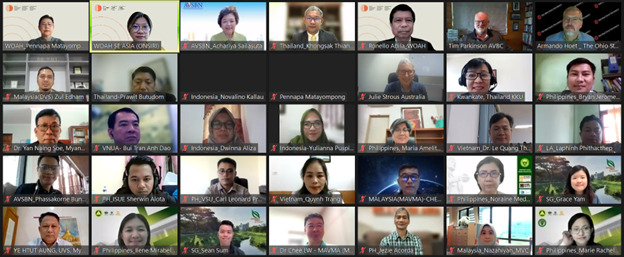Background
Strengthening the quality of veterinary education establishments (VEEs) and veterinary statutory bodies (VSBs) in South-East Asia will significantly provide an effective veterinary workforce in the region. Since 2011, WOAH Sub-Regional Representation for South East Asia (SRR-SEA) has continuously supported the strengthening of VEEs and VSBs in South-East Asia in close collaborations with the South-East Asia Veterinary School Association (SEAVSA) and the ASEAN Veterinary Statutory Body Network (AVSBN).
The latest WOAH workshop on VEE Accreditation held in Thailand in October 2022 resulted in the development of South-East Asia veterinary school accreditation standards. As the ASEAN Member States (AMS) have attempted to proceed with the transboundary mobility of veterinarians between the AMS, the application of these standards in VEE accreditation would be the baseline to facilitate the movement of veterinarians who graduated from the accredited VEEs. In addition, WOAH SRR-SEA has collaborated with the Ohio State University (OSU), USA in supporting the VEEs in AMS to perform a self-assessment of their curriculum against the WOAH Day 1 Competencies and create a comprehensive action plan to best address the gaps found.
The VSBs in South-East Asia are diverse in capacity and authority. Many countries have benefited from long-established regulatory bodies or rely on the veterinary authority to act as a VSB, while others are still at the preliminary stage of establishing a VSB and its associated legislation. The support of WOAH SRR-SEA in the establishment of AVSBN in 2017 has led to the development and implementation of the AVSBN strategy to strengthen the capacity of VSBs/VSB equivalent authorities, particularly the drafting of the ASEAN Mutual Recognition Arrangement (MRA) on Veterinary Practitioners to facilitate the mobility of veterinarians within ASEAN.
To escalate the capacity and quality of VEEs and VSBs/VSB equivalent authorities, WOAH SRR-SEA in collaboration with the SEAVSA and AVSBN and with funding support from the Australian Government organised the Virtual Workshop on the Way Forward of VEEs and VSBs in South-East Asia from 27 February to 1 March 2023.
Objectives:
CONCLUSIONS AND RECOMMENDATIONS
1. VEE accreditation for the oversea practice of veterinary graduates (Dr Tim Parkinson, AVSBN Advisor)
2. South-East Asia veterinary school accreditation standards (Dr Prawit Butudom, Secretariat of SEAVSA and AVSBN)
3. Progression of VEE curriculum assessment (AID-1C Project) in South-East Asia (Dr Armando Hoet, OSU)
4. Experience with AID-1C Project implementation in the Philippines (Dr Maria Amelita Estacio, UPLB)
5. Experience with AID-1C Project implementation in Thailand (Dr Kwankate Kanistanon, KKU)
6. Progression of the establishment of South-East Asia Veterinary School Accreditation Body (Dr Achariya Sailasuta, Chair of AVSBN)
7. Veterinary legislation and regulation relevant to a VSB (Dr Pennapa Matayompong, WOAH)
8. Updates on VSB establishment
9. Updates of VSB on VPP regulation
10. Strategy of AVSBN (2023-2025) (Dr Achariya Sailasuta, Chair of AVSBN)
11. How the AVBC can support VSBs/VSB equivalent authorities in South-East Asia (Dr Julie Strous, AVBC)
12. Linkage of ASEAN Qualifications Reference Framework (AQRF) to the veterinary workforce (Mr Ilham Perintis, ASEAN Secretariat)
13. Draft ASEAN Mutual Recognition Arrangement (MRA) on Veterinary Practitioners (Dr Thanes Sucharikul, AVSBN)
Draft ASEAN Mutual Recognition Arrangement ov Veterinary Practitioners (file)
14. Approaches to workforce assessment and planning (Dr David Sherman, WOAH)
(NEW)
